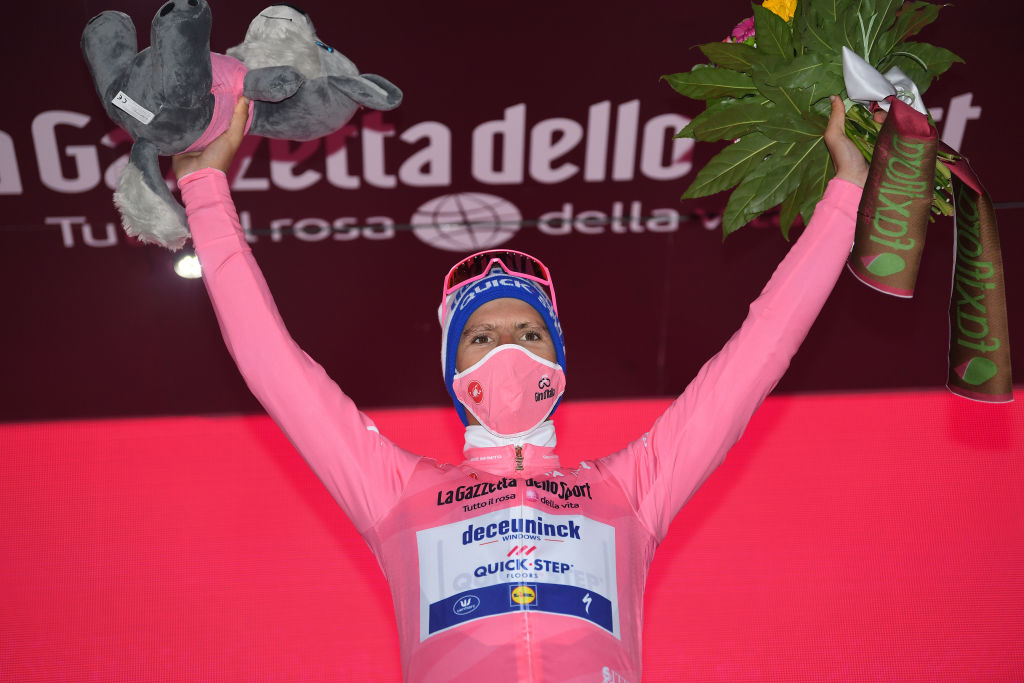Almeida extends Giro d’Italia lead with solid mountain performance
Portuguese rider takes third on stage 5, garners bonus seconds

“My confidence is growing” was how João Almeida (Deceunink-QuickStep) summed up his feelings after managing not only to retain his overall lead in the mountainous stage 5 of the Giro d’Italia, but to strengthen it.
Third at the finish in the small group sprint for the line at the end of a rain-soaked, lengthy trek through the mountains of Calalbria, Almeida’s podium finish allowed him to gain four bonus seconds on the main group of GC contenders.
And if that wasn’t a boost enough to his morale, Almeida had already seen how his closest pursuer on GC, Jonathan Caicedo (EF Pro Cycling), had faded badly on the final climb of Valico Montescuro, with the Ecuadorian rider’s time gap on the race leader ballooning from a scant two seconds after stage 4 to over 16 minutes just 24 hours later.
As a result, Almeida’s closest pursuer is now Pello Bilbao (Bahrain McLaren), at a much less threatening distance of 43 seconds. Barring disaster, then, Almeida should now remain in the Giro's top spot overall at least until next Sunday, when the Giro tackles its next tough mountain stage at Rocarasso.
The young Portuguese rider, already his country’s longest-ever leader in the Giro d’Italia, said he had been prepared mentally to lose the lead on Wednesday, but he said that, in the end, he had good legs throughout the stage.
“I wanted to do the sprint, to show that I’m not in the maglia rosa by chance, and I’ll keep fighting for this jersey as long as I can," he said.
“I have a good gap now on GC and for sure the maglia makes me feel stronger and gives me confidence.”
Get The Leadout Newsletter
The latest race content, interviews, features, reviews and expert buying guides, direct to your inbox!
Almeida said that the rain and cold had made a tough stage even harder, but trotted out the familiar cycling adage, “it’s the same for everybody”, as shorthand for saying he had coped well with the Giro’s second day of bad weather.
Having spent the bulk of the final ascent in the middle of the pack, Almeida disagreed with one reporter’s claim that it had not been a GC day, saying, it has “not been easy, Trek-Segafredo were really pushing it towards the top, and that last descent was a bit crazy. We were only a small group at the finish but I could hold on ok.”
Thanks to his considerably bigger advantage overall, Almeida said the pressure at the top of the GC, while still high, had dropped notably, or, as he put it, “I can be chilling now, take the lead on the day by day.”
Thanks to his solid climbing performance, Almeida was in a good mood and optimistic, saying, “Who knows? nothing is impossible today”, when a reporter asked him if he thought he could stay in pink as far as Milan.
And while that possibility of becoming Portugal’s first Grand Tour winner still seems remote, having proved he can not only take a lead on a major mountain stage, but defend it as well, at the very least Almeida's chances of overall success are certainly less remote than 24 hours earlier.
Regardless of what happens in the 16 remaining stages, Almeida is already quietly making Portuguese cycling history. Quite apart from being the Portuguese racer who's spent the longest in the maglia rosa, in terms of Grand Tour leads in general, another day in pink will see him equal compatriot Acacio Da Silva’s four days in yellow in the 1989 Tour de France.
A little further down the line, another two days in pink would see him draw level with the Grand Tour record set by his country’s greater ever racer, Joaquim Agostinho, who spent a total of five days in the lead of the Vuelta a España way back in 1976: that’s distinguished company for any rider to keep, but for a 22-year-old rookie pro like Almeida in his first Grand Tour, notably more so.
Alasdair Fotheringham has been reporting on cycling since 1991. He has covered every Tour de France since 1992 bar one, as well as numerous other bike races of all shapes and sizes, ranging from the Olympic Games in 2008 to the now sadly defunct Subida a Urkiola hill climb in Spain. As well as working for Cyclingnews, he has also written for The Independent, The Guardian, ProCycling, The Express and Reuters.
